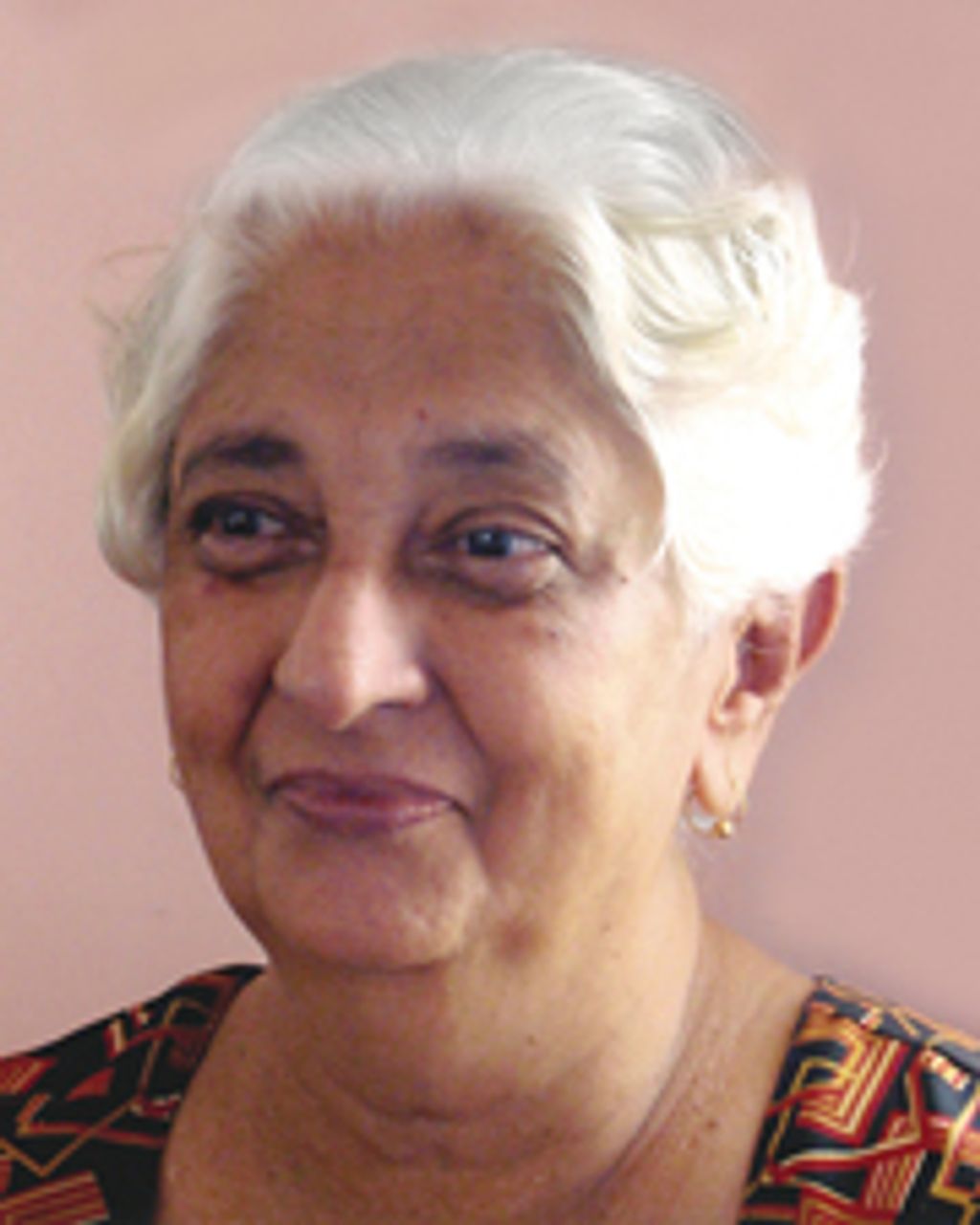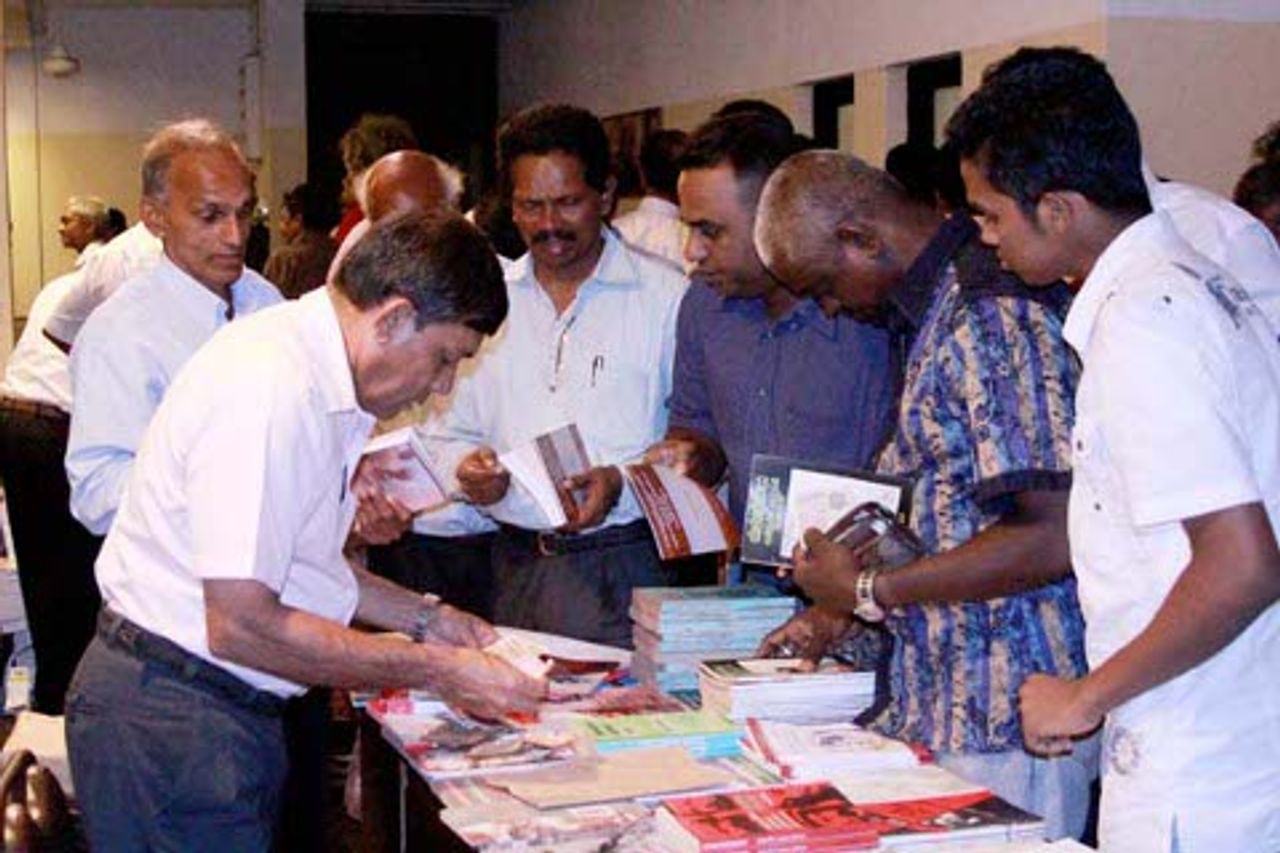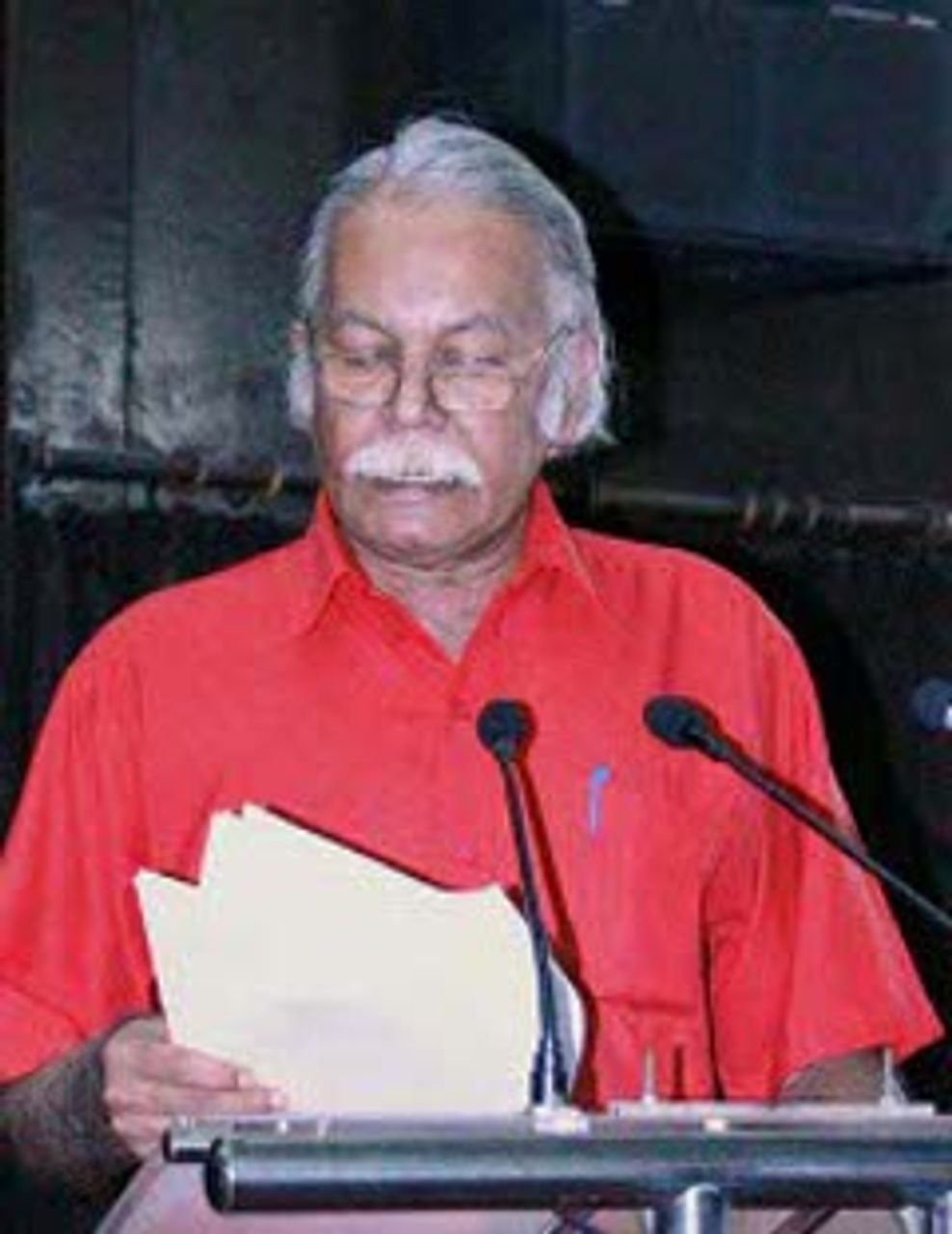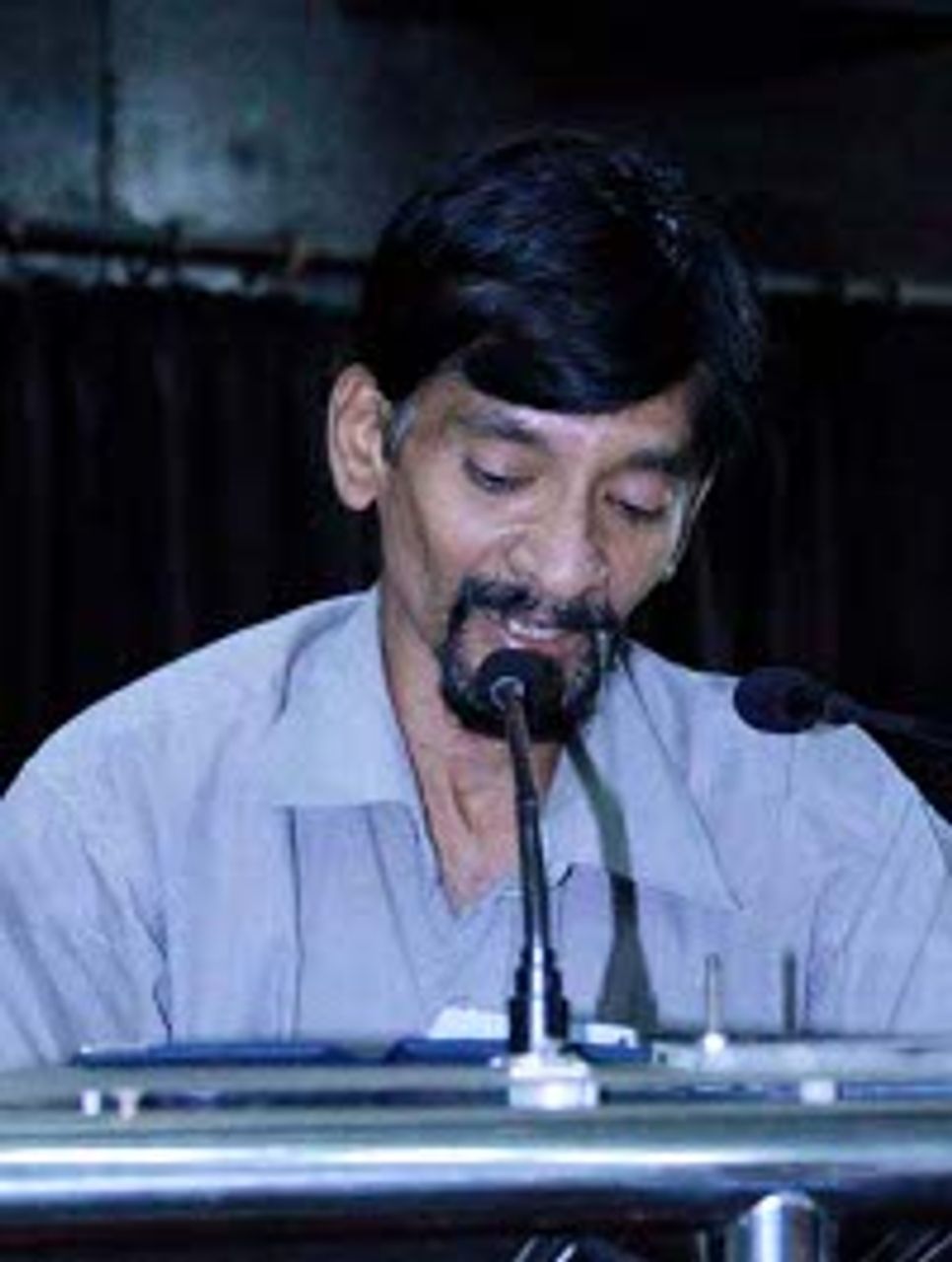 Piyaseeli Wijegunasinghe
Piyaseeli WijegunasingheIn commemoration of the first anniversary of the death of Piyaseeli Wijegunasinghe, a long-time member of the Socialist Equality Party (SEP) in Sri Lanka and Marxist art critic, a book entitled Piyaseeli Wijegunasinghe–A Tribute was launched in Colombo on September 14. The 420-page book is a collection of articles by SEP members, prominent artists and intellectuals on Piyaseeli’s contribution to Marxist art criticism.
Mano Fernando, a supporter of the SEP and a well-known translator, edited the book, published by Wijesooriya Grantha Kendra. The book launch organised by the publisher at the Mahaweli Centre was attended by over 200 people, including SEP members, supporters, veteran and emerging artists, intellectuals and colleagues and students of Piyaseeli at the University of Colombo. Piyaseeli’s son Keerthi Ranaba and daughter-in-law Anjana were among them.
K. Ratnayake, a member of International Editorial Board of the World Socialist Web Site and the SEP political committee, chaired the meeting. After welcoming the audience and paying respect to the memory of Piyaseeli, he explained that her works in the field of art criticism were an integral part of her struggle to build the world Trotskyist movement, the International Committee of the Fourth International (ICFI) to resolve the crisis of working class leadership.
 SEP literature table
SEP literature tableRatnayake drew attention to two issues emerging out of Piyaseeli’s work. “She was the first to confront the idealist method of art criticism propounded by major Sri Lankan bourgeois artists, Martin Wickramasingha, Ediriweera Sarachchandra and Gunadasa Amarasekera, on the basis of the Marxist aesthetic tradition. Her early works, A Materialist Study of Literature in 1982 and Contemporary Sinhala Literary Criticism: a Marxist Study in 1987, represent a heroic attempt to refute the idealist methodology which dominated Sinhala literary criticism,” Ratnayake said.
“At the same time, Piyaseeli unrelentingly struggled to defend the artists who were subjected to witch hunts by the capitalist governments. She was at the forefront of the campaigns waged by the SEP and its predecessor, the Revolutionary Communist League, to mobilise the working people, intellectuals and artists in defence of freedom of expression and artistic works.
“Now we are in a period where the continuation of her struggle is enormously required. We live in an era where the world capitalism as a whole is mired in an ever-deepening crisis, both economically and politically, and working people are driven to revolutionary struggles, making the need of the revolutionary socialist program of the working class all the more decisive,” Ratnayake concluded.
 Wije Dias reading David Walsh's speech
Wije Dias reading David Walsh's speechThe main event of the book launch was the presentation of a speech sent by David Walsh, the arts editor of the WSWS, “In memory of comrade Piyaseeli Wijegunasinghe”. Wije Dias, the SEP general secretary and life-long companion of Piyaseeli, read the Sinhala translation of Walsh’s speech to the audience.
“It is an honour to be invited to contribute to this volume in honour of comrade Piyaseeli Wijegunasinghe, a Trotskyist for her entire political life, a fighter for the working class and a profound critic and thinker, especially on artistic matters,” Walsh stated.
Explaining the significance of the launching of the WSWS in 1998, Walsh wrote: “The WSWS, to which comrade Piyaseeli fruitfully contributed, is a product of a new stage in the global class struggle and in the development of the international Marxist movement. Technological and economic changes made it feasible and necessary, but as a conscious political act its launch in February 1998 was the outcome of protracted struggles within the Fourth International over the course of decades.”
Walsh drew attention to the role of revolutionary socialists in the field of art and culture. “The present social and political situation, characterised by global economic slump and mass suffering, open neo-colonial banditry and the flight to the camp of imperialism by various formerly ‘left’ forces, points toward the intensification of the class struggle and the eruption of social upheaval.
“In producing material on culture and art we are seeking to combat bourgeois ideology and prejudices, the influence of national-opportunism and bureaucracy, all the narrowness and backwardness continuously promoted by the establishment, especially through the medium of the unions and other moribund ‘labour organisations,’ who aim to tie the working class to the ideological apron-strings of the ruling elite.
“The eruption of mass struggles will not diminish the need for arts material on the WSWS or in the pages of our other publications. Economic and even political struggles will not solve all the problems. If we are serious about what we have been saying for the past two decades in particular, the development of the cultural, psychic and moral sensibilities of the most advanced, socialistically-minded workers and young people remains a critical question for us,” he insisted.
In the course of his speech, which will be published on the WSWS, Walsh elaborated on the Marxist approach to art, tracing the profound but complex relationship between the general crisis of perspective besetting artists and the traumas and problems of historical development in the past century.
“Even when the novelist or filmmaker today protests vehemently against the existing conditions, or aspects of them, he or she is generally cut off from an understanding of the great events of the 20th century—the Russian Revolution, the emergence of Stalinism, the rise of fascism, Trotsky’s struggle for the continuity of revolutionary socialism, the two imperialist wars—that would provide the work in question a historical and social, and moral, depth is nearly always absent.”
Walsh concluded by pointing that the job of revolutionaries was not merely to point out what perfidious, or breathtaking, things the artists are doing, but to understand what the difficulties are, the historical, social, ideological obstacles, point the way forward and create conditions for the rebirth of a more critical, socialist-minded culture.
“We will pay the greatest tribute to comrade Piyaseeli, who had a deep understanding of these matters, by persevering in and deepening our work along these lines.”
 Darshana Medis
Darshana MedisDarshana Medis, a Marxist art critic and poet, was the final speaker. “What were the thoughts that popped up in your minds when listening to the lecture of Walsh on art and delivered in the voice of Comrade Wije?” he asked rhetorically. In answering, he said: “The lecture symbolised undoubtedly the remarkable and inseparable relationship between theory and practice in the intervention of the Marxist movement in the field of art, reunifying that which had been separated into two by the idealists. Comrade Piyaseeli devoted her entire adult life to fight for some of these concepts,” Medis said.
Describing Piyaseeli’s contribution to the uplifting of Marxist literary criticism, Medis said that even though her contribution was relatively small in volume, it was immense and weighty in essence. She had broadened the horizons of modern aesthetics, giving a new dimension to artistic appreciation through her books and other wonderful critical pieces.
“Piyaseeli was a critic in her own right. Based on classical Marxism, she penetrated into the very depth—the economic and social roots—of a given work of art and examined its artistic value and impact on the connoisseur and on society as a whole. She produced a number of reviews on wide range of artistic works with great intellectual insight and passion.”
Medis explained that Piyaseeli had fought vehemently and unconditionally with numerous types of idealists, empiricists, Stalinists, racists, post-modernists, petty-bourgeois philistines, political degenerates and even feminists, who had attacked her on various fronts. “Rising as a tribune, she conquered those challenges with great intellectual prowess despite her deteriorating health. Her struggle won’t come to an end with her demise. Definitely, future generations will study and assimilate her works and continue her struggle,” he concluded.
The authors also recommend:
Piyaseeli Wijegunasingha, a Sri Lankan Trotskyist, dies at 67
[6 September 2010]
SEP (Sri Lanka) holds funeral for comrade Piyaseeli Wijegunasingha
[14 September 2010]
